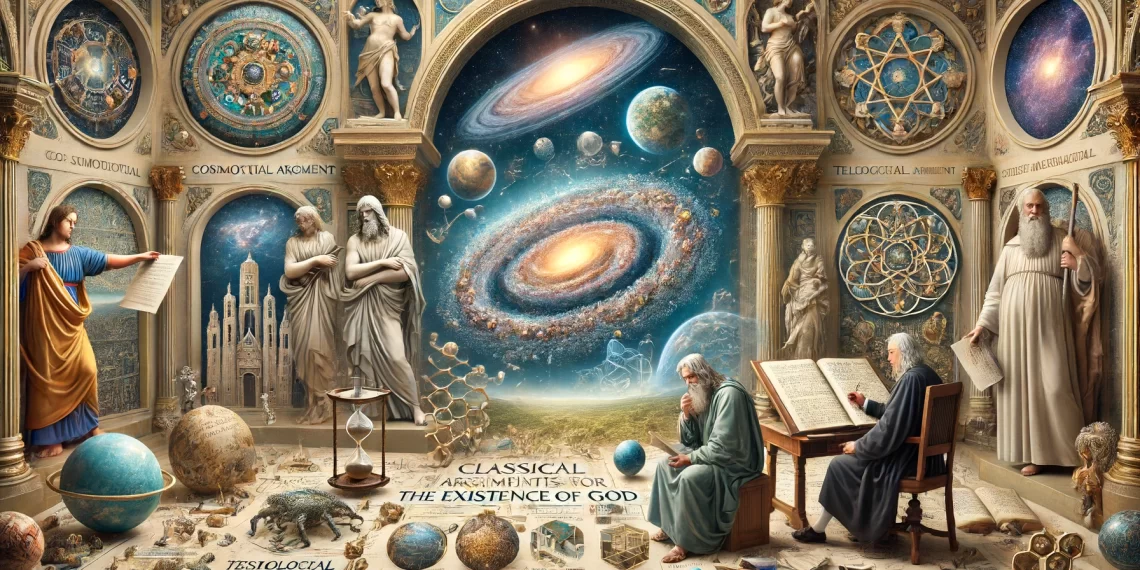Views: 0
Doctoral Degree Lesson in Biblical Studies
Lesson Title: Classical Apologetics: Study of Classical Arguments for the Existence of God
Level of Education: Doctoral Degree
Purpose
To examine and analyze classical arguments for the existence of God, focusing on the cosmological and teleological arguments.
Objectives
- To understand the key principles of classical apologetics.
- To explore the cosmological and teleological arguments for the existence of God.
- To critically evaluate the strengths and weaknesses of these arguments.
- To apply these arguments in contemporary apologetic discourse.
Concepts, Terms, and Keywords
- Classical Apologetics: An approach to apologetics that emphasizes the use of rational arguments and evidence to demonstrate the truth of Christianity.
- Cosmological Argument: An argument for the existence of God that asserts that everything that begins to exist has a cause, and this cause is God.
- Teleological Argument: An argument for the existence of God that asserts that the order and complexity in the world point to a purposeful designer.
- Rationalism: A belief in the primacy of reason and evidence in establishing truth.
- Metaphysics: A branch of philosophy that explores the fundamental nature of reality, including concepts such as being, existence, and causality.
Lesson Content
Introduction to Classical Apologetics
- Definition and significance of classical apologetics.
- Historical development and key proponents, including Thomas Aquinas and William Lane Craig.
The Cosmological Argument
- Overview of the cosmological argument and its variants (e.g., the Kalam cosmological argument).
- Key proponents: Thomas Aquinas, William Lane Craig.
- Explanation of the argument:
- Everything that begins to exist has a cause.
- The universe began to exist.
- Therefore, the universe has a cause.
- Bible Verses: Genesis 1:1, John 1:3, Hebrews 3:4.
- Critical evaluation: strengths and weaknesses of the cosmological argument.
- Practical Application: Using the cosmological argument in dialogues with skeptics.
The Teleological Argument
- Overview of the teleological argument, also known as the argument from design.
- Key proponents: William Paley, Richard Swinburne.
- Explanation of the argument:
- The complexity and order in the universe cannot be due to chance.
- Therefore, there must be an intelligent designer.
- Bible Verses: Psalm 19:1-4, Romans 1:20, Job 12:7-10.
- Critical evaluation: strengths and weaknesses of the teleological argument.
- Practical Application: Using the teleological argument to demonstrate the existence of God through the design in nature.
King Jesus’ Model/Example
- Jesus used rational arguments and illustrations from nature to reveal God’s truth.
- Examples of Jesus’ use of creation to teach about God’s kingdom.
- Bible Verses: Matthew 6:26-30, Luke 12:24-27.
Exam Questions
- Define classical apologetics and explain its significance.
- Answer: Classical apologetics is an approach that emphasizes the use of rational arguments and evidence to demonstrate the truth of Christianity. It is significant because it provides logical and philosophical foundations for the faith. (1 Peter 3:15)
- Explain the cosmological argument for the existence of God.
- Answer: The cosmological argument posits that everything that begins to exist has a cause; since the universe began to exist, it must have a cause, which is God. (Genesis 1:1)
- Discuss the key proponents of the cosmological argument and their contributions.
- Answer: Key proponents include Thomas Aquinas, who formulated the Five Ways, and William Lane Craig, who developed the Kalam cosmological argument. (John 1:3)
- What are the strengths of the cosmological argument?
- Answer: Strengths include its logical coherence and its ability to address the question of why anything exists rather than nothing. (Hebrews 3:4)
- Identify and explain one criticism of the cosmological argument.
- Answer: One criticism is that it relies on the assumption that the universe had a beginning, which some argue could be challenged by certain interpretations of cosmology. (John 1:3)
- Describe the teleological argument for the existence of God.
- Answer: The teleological argument asserts that the complexity and order in the universe point to a purposeful designer, which is God. (Psalm 19:1-4)
- Who are some key proponents of the teleological argument and what are their main contributions?
- Answer: Key proponents include William Paley, who proposed the watchmaker analogy, and Richard Swinburne, who provided probabilistic arguments for design. (Romans 1:20)
- What is one strength of the teleological argument?
- Answer: One strength is its appeal to empirical evidence from nature, making it accessible and relatable. (Job 12:7-10)
- Discuss one criticism of the teleological argument.
- Answer: One criticism is the problem of imperfect design, where the existence of natural evils and suboptimal structures challenges the idea of an all-powerful, benevolent designer. (Romans 1:20)
- How did Jesus use illustrations from nature in His teachings?
- Answer: Jesus used illustrations from nature, such as birds and flowers, to teach about God’s provision and care, demonstrating the connection between creation and the Creator. (Matthew 6:26-30)
Practical Applications (Bible-based)
- Use the cosmological and teleological arguments in evangelism to present logical reasons for the existence of God.
- Develop a personal approach to apologetics by integrating classical arguments with biblical teachings.
- Engage in respectful dialogues with skeptics, using classical arguments to address their questions and doubts.
Research Citations in MLA Format
- Craig, William Lane. Reasonable Faith: Christian Truth and Apologetics. Crossway, 2008. (Available in eBook format)
- Swinburne, Richard. The Existence of God. Clarendon Press, 2004. (Available in eBook format)
- Aquinas, Thomas. Summa Theologica. Christian Classics, 1981. (Available in eBook format)
- Paley, William. Natural Theology. Oxford University Press, 2008. (Available in eBook format)
- Geisler, Norman L. Christian Apologetics. Baker Academic, 2008. (Available in eBook format)
This lesson provides a comprehensive study of classical apologetics, focusing on the cosmological and teleological arguments, and emphasizes the application of these arguments in contemporary apologetic discourse, all centered around the teachings and example of Jesus Christ.
Tags: Classical Apologetics











